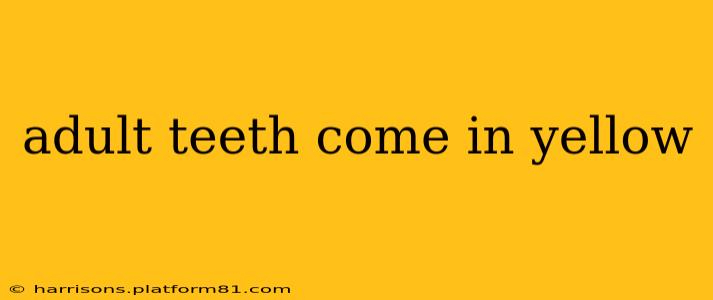Many adults find themselves concerned when their newly erupted adult teeth appear yellow. It's a common worry, but understanding the reasons behind yellowing teeth can alleviate anxiety and guide you toward appropriate solutions. This article delves into why adult teeth might appear yellow, debunking myths and offering practical advice.
Why Do My Adult Teeth Look Yellow?
The simple answer is that tooth color varies naturally. While many associate pearly white teeth with ideal oral health, the reality is that a wide spectrum of natural tooth shades exists. Several factors contribute to the perception of yellow adult teeth:
- Dentin: Beneath the enamel, the dentin layer is naturally yellowish. As the enamel thins with age, the underlying dentin becomes more visible, giving teeth a yellower appearance. This is a completely normal process.
- Enamel Thickness: Individuals naturally have varying enamel thicknesses. Thinner enamel allows more of the underlying dentin to show through, leading to a more yellow appearance.
- Genetics: Your genes play a significant role in determining the shade of your teeth. Some people are genetically predisposed to having yellower teeth than others.
- Stain Accumulation: Over time, various substances can stain your teeth. These include coffee, tea, red wine, tobacco products, and certain foods. These stains accumulate on the enamel's surface, darkening the tooth's appearance.
- Medications: Certain medications, such as tetracycline antibiotics, can cause tooth discoloration during tooth development. This type of staining is often more pronounced and affects the tooth's internal structure.
Are Yellow Adult Teeth a Sign of Poor Oral Health?
Not necessarily. While yellowing teeth can sometimes be associated with poor oral hygiene, leading to plaque and tartar buildup, the natural variation in tooth color shouldn't be equated with poor health. Regular brushing, flossing, and professional cleanings are vital for maintaining oral health, regardless of your natural tooth shade.
How Can I Whiten My Teeth?
If you're concerned about the yellowing of your adult teeth, several options exist for whitening:
- Professional Whitening: A dentist can provide in-office whitening treatments using professional-grade bleaching agents, often producing the most dramatic results.
- At-Home Whitening Kits: Many over-the-counter whitening kits are available, but it's crucial to choose reputable brands and follow instructions carefully to avoid damaging your enamel.
- Lifestyle Changes: Reducing the consumption of staining substances like coffee, tea, and red wine can help prevent further staining.
- Regular Cleanings: Professional dental cleanings remove surface stains and plaque, improving the overall appearance of your teeth.
What Causes Yellowing in Adult Teeth? (PAA Question)
As mentioned above, the yellowing of adult teeth can be attributed to a variety of factors, including the natural yellowing of dentin as enamel thins with age, variations in enamel thickness, genetic predisposition, staining from food and drinks, medication side effects, and even aging. It's not always a cause for concern.
How Can I Prevent My Teeth From Yellowing? (PAA Question)
Preventing yellowing teeth involves a combination of good oral hygiene practices and lifestyle choices. This includes:
- Brushing twice daily with fluoride toothpaste.
- Flossing daily to remove food particles and plaque between teeth.
- Regular dental checkups and cleanings.
- Limiting consumption of staining substances like coffee, tea, red wine, and tobacco.
- Using a straw when drinking beverages known for staining.
Is It Normal for Adult Teeth to Turn Yellow? (PAA Question)
Yes, it's perfectly normal for adult teeth to appear more yellow over time. This is largely due to the natural aging process, where enamel thins and the underlying dentin becomes more visible. The degree of yellowing varies from person to person.
Can I Whiten My Teeth at Home Safely? (PAA Question)
While at-home whitening kits are readily available, it’s crucial to choose reputable brands and follow the instructions carefully. Over-the-counter whitening products often contain weaker bleaching agents than professional treatments, so results may be less dramatic, and improper use can potentially damage your enamel. Consult your dentist before starting any at-home whitening regimen.
Disclaimer: This information is for general knowledge and informational purposes only, and does not constitute medical advice. Always consult with a qualified dentist for any concerns about your oral health or before undertaking any teeth whitening procedures.
